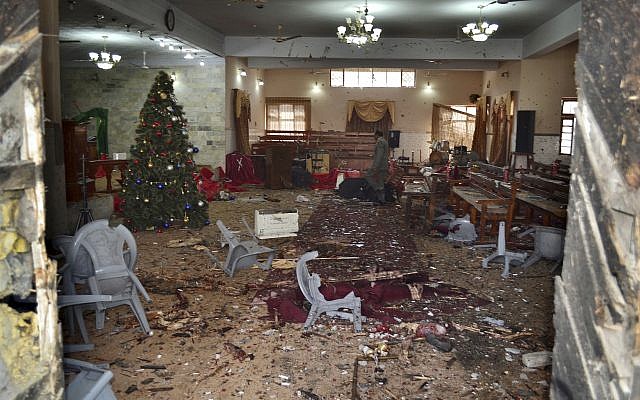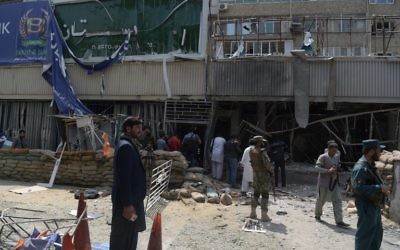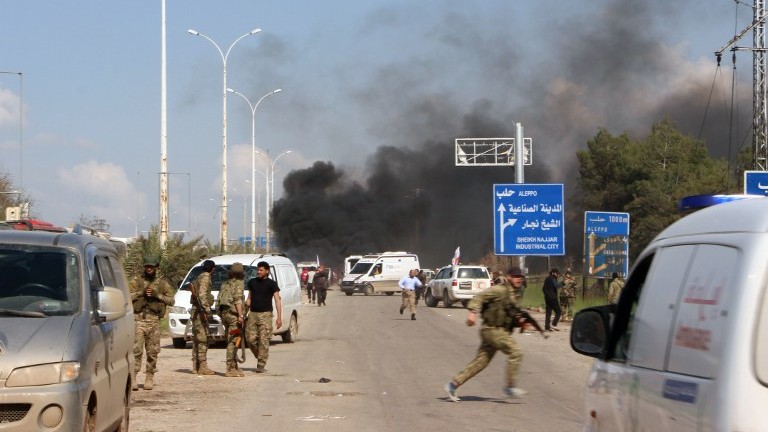Tel Aviv study says global decrease in 2017 likely due to setbacks suffered by Islamic State; no bombings in Israel and West Bank, but 13 foiled;

The year 2017 holds a dubious record: the largest number of suicide bombings worldwide carried out by women and girls.
According to a new study by Tel Aviv’s Institute for National Security Studies, released on Sunday, nearly a fifth of the 348 documented suicide attacks perpetrated in 2017 were performed by females, the vast majority of them in Africa, by the jihadist group Boko Haram.
Not noted in the INSS report is that many, if not most, of the 126 women and girls who carried out suicide bombings for the Islamic State affiliated group appeared to have been brainwashed, forced or tricked into doing so.
The study was written by Aviad Mendelboim and Yoram Schweitzer, of INSS’s Terrorism and Low-Intensity Conflict Research Program, using data from at least two different, independent sources.

The past year saw a drop in the total number of suicide attacks worldwide, to from 469 in 2016 and 452 in 2015.
“This is the lowest number of suicide attacks since 2013. Approximately 4,310 people were killed and 6,700 people wounded in suicide attacks this past year,” according to the report.
“Despite the decline in the extent of the phenomenon relative to the previous year, suicide terrorism served as a weapon employed by paramilitary forces in their operations against state militaries, mainly but not only by Islamic State combatants,” the researchers wrote.
The study credited the decrease, in part, to the battlefield losses of the Islamic State terrorist group.
“With the military defeats suffered by the Islamic State in Iraq and in Syria and the loss of the caliphate’s territorial base, it appears that a further decline can be expected in the coming year in the number of suicide bombers who can be directly deployed,” according to the report.

Mendelboim and Schweitzer acknowledged that the figure of 348 suicide bombings is likely low, as it was difficult to verify some of the data coming from Iraq and Syria, two areas that are frequent sites of suicide bombings by the Islamic State terrorist group.
From the figures they collected, the researchers found that approximately two-thirds of the attacks were carried out by the Islamic State and organizations who have pledged allegiance to it, like Boko Haram, and a quarter of the suicide bombings were perpetrated by Al-Qaeda and its affiliates — amounting to some 90 percent of the attacks.
“No responsibility was claimed for the rest of the suicide attacks that were carried out this year, and it is possible that some of them also relate to this ideological current, apart from two suicide attacks that were perpetrated by Houthi rebels in Yemen and the Kurdish underground (PKK) in Turkey,” according to the INSS study.
Approximately two-thirds of the world’s suicide bombings occurred in four countries: Afghanistan (67), Iraq (64), Nigeria (57) and Syria (40).
In 2017, there were no suicide bombings in Israel or the West Bank, though the head of the Shin Bet last month told the Knesset that 13 such attacks were foiled over the past year.
December also saw a stabbing attackon a Border Police officer committed by a Palestinian man in Ramallah wearing what appeared to be a suicide bomb belt, but was later found to have been a dud.

While there were no suicide bombings in Israel and the West Bank, a so-far unique one took place in the Gaza Strip in 2017.
“For the first time, the Gaza Strip was the site of a suicide attack against non-Israelis, when an activist from the Salafi jihadist movement activated an explosive belt against Hamas forces who tried to arrest him at the Rafah border crossing,” according to the report, referring to a bombing in August.
The 348 suicide bombings of 2017 were carried out by approximately 623 terrorists. Of them, just over a fifth — 137 — were women, who perpetrated 61 suicide attacks in 6 countries, as compared to 77 women the previous year and 118 women the year before.

The vast majority — 92 percent — were carried out by the Boko Haram terrorist group in West Africa, mostly Nigeria, Chad, Cameroon and Niger.
According to UNICEF, the United Nations Children’s Fund, the Nigerian-based terrorist group recognized that women and children, especially girls, were less likely to arouse the suspicion of security forces and alert citizens, enabling them to enter crowded public spaces before detonating a bomb.
“It is unclear whether some of these children are even aware of what they are being asked to do,” the UN agency wrote in April 2017.
“That they are carrying explosives in a belt on their chests is incontrovertible, but it has been difficult to ascertain if some of these children are being used to transport the devices to other locations and other active combatants or if they are being forced into a perverse death mission in exchange for promised redemption and martyrdom.”

UNICEF documented one case of a teenage girl from Chad named Amina who was “manipulated and drugged” and forced into carrying out a suicide bombing with three other girls.
For years, Boko Haram has been kidnapping children in Nigeria, the most famous case being the 276 girls who were taken from the Chibok school, prompting the creation of the “Bring Back Our Girls” movement.
Kidnapped boys are used as child-soldiers, while girls, some as young as 12 and 13, are declared wives and repeatedly raped, often becoming pregnant by their rapist, according to the UN.
As reported by The Times of Israel
